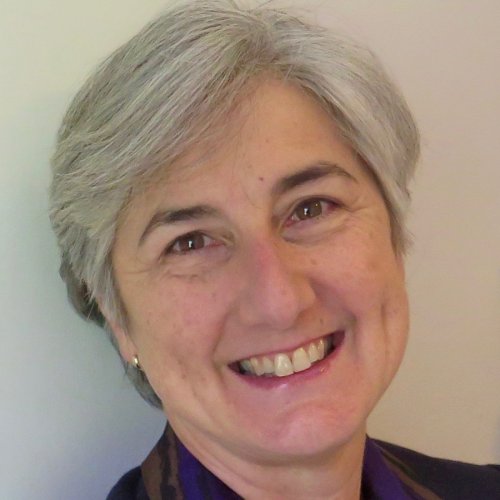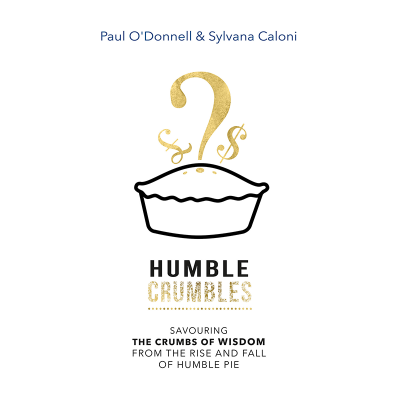“Fear of Failure and the Importance of Self-awareness”
Sylvana Caloni has never been afraid of challenges! She transitioned from the financial world to setting up her own business in leadership consulting and executive coaching. She has built a prolific professional background combining academic, financial and leadership development careers. Insights and wisdom accumulated over the years are included in her latest book "Humble Crumbles: Savouring the crumbs of wisdom from the rise and fall of Humble Pie", co-authored with Paul O’Donnell.
Q: Can you tell us a bit about yourself? Please include about your background.
A: My childhood memories are of the wonderful stories my parents, grandmother and uncles told about their lives in Italy and Alexandria, Egypt. I have dual Italian and Australian nationality. My multi-cultural family background gives me an appreciation of different cultures, foods, values and traditions; a window on so many ways of seeing the world. And at times I feel like an outsider as I don’t fit neatly into a national box. I consider this an advantage.
My first job was as in academia where I tutored economics while completing my Masters degree in the History of Economics. From there I moved to global financial markets, working first in bond sales and then equity funds management at senior levels. I was relocated to London from Sydney. Within two days of arriving my role was made redundant. My business relationships were in the US and Australia and I knew very few people in London. So I had to create relationships and networks from scratch. This propelled me to leadership roles in several organisations. I was the Founding Chair in London of Advance, a network for global Australian professionals and President of Women in Banking and Finance (WIBF). Now I am a Vice Chair of International Women’s Forum (IWF-UK).
I transitioned from the financial world to setting up my own business in leadership consulting and executive coaching. For some, this seems a 180-degree turn. However, for me, there is a thread throughout my academic, financial and leadership development careers. I have always challenged accepted norms to find new interpretations and possibilities, whether it was in my academic theses, value investing or partnering with coaching clients. In each, I’ve looked beyond the apparent to uncover the real.
Q: Why Humble Crumbles?
A: When I left the world of funds management and equity analysis I didn't appreciate the importance of self-awareness and self-compassion, to success. By partnering with a coach for my own development and working with my coachees I learned just how critical they are. Also, many of us have a fear of failure. This constrains our risk taking and opportunities. Yet most successes result from trial, error and adaptation.
Paul narrates his own entrepreneurial journey starting up and closing down his retail pie business. It is raw, real and humorous. He courageously acknowledges his mistakes and together we uncover his blind spots and provide resources so that others can mitigate or avoid these mistakes. We peel back the layers of the entrepreneur’s mindset, values, attitudes and responses to risk.
Q: Tell us about the profile of individuals and organisations that you work with.
A: Initially, my clients were in middle to senior roles in financial services firms as they appreciated the credibility and experience I brought from my own seniority in global financial markets. Over time my clients are in sectors including manufacturing, professional services, communications, retail, pharma and charity. A common thread is that they find the shift from management to leadership frustrating. Even though they are knowledgeable and have an expertise in their jobs, they are less accomplished at navigating the different learning, working and communication styles of their colleagues and reports.
Q: What part of working as a coach do you particularly enjoy?
A: I feel that I have fulfilled my purpose as a coach when my coachees gain insights that they embrace and develop. They use this to shift the way they make sense of their world (logically, emotionally and somatically). This enables them to navigate challenges more successfully and to see opportunities that weren’t available to them previously. What feeds me is that I learn from their experiences, humility, courage and risk taking.
"We need to shine the light on women’s success, talent and contributions to make the “extraordinary ordinary”
Q: What do you consider your biggest accomplishments to date?
A: Over the years I have written lengthy academic theses, articles for magazines and journals. Yet writing a book I felt more exposed. I experienced “writer’s block” because I was concerned that my teachers, clients and associates would consider it too superficial or that it had all been said before. I got over my blockage when a fellow IWF member said to me “Sylvana, it’s not about you. It is the value you bring to your readers”.
I’m also proud of the fact that I’ve had many failures and faced obstacles, and they did floor me at times, yet I got back up and found inner strength and support from others to pivot and find new opportunities.
Q: What do you see as key challenges for our societies moving forward?
A: The pandemic has shone the light on the inequities in healthcare, finances, education, employment opportunities and access to digital platforms among various groups who are not part of the dominant culture or power groups. As the discrepancies widen this foments the risk of societal unrest. Concentrating power and privilege inhibits creativity and multiple, diverse solutions and increases risk of disease and stagnation. I’m also concerned that without careful consideration and challenging norms, Artificial Intelligence is being designed which can replicate stereotypes and barriers. The other key challenges are obesity and poor nutrition and climate change.
Q: What is it that you most struggled with during the pandemic period?
A: The lack of spontaneity and physical connection in interacting with others. I revel in conviviality, good food, wine and stories while sitting around a dining table and receiving and giving a good hug.

Q: IWF is a fantastic network and a support system for career women around the world. Do you think that women make better leaders? Please explain your thoughts.
A: While I believe that gender plays a role in how women behave as leaders because of how we are socialised, the roles we play in our families and communities, and the way we have had to negotiate and navigate to make an impact in a world largely shaped by men’s thinking and experiences, I do not believe that women are inherently better or worse leaders.
The traits of leadership that I believe are important to the complexities of our modern world are an ability to be curious and listen deeply, to thoughtfully consider multiple perspectives and not dismiss those that don’t reflect the leader’s experience or understanding, to experiment and take calculated risks, to be courageous, have strong convictions and adapt when evidence suggests a contrary position, to support and lift others up and devolve responsibility, to have an appreciation of what is ‘fit for purpose’ and to challenge injustice.
Some women and some men demonstrate these traits. If the leader is fearful and greedy, they are more likely to be egotistical and controlling. I have witnessed this type of leadership in both men and women.
What I admire about my fellow members of IWF is that they are generous with their knowledge and wisdom, they are supportive and nudge each other forward and they have a sense of fun and appreciation across a spectrum of interests.
is actually “what I have learned” and part of our stage of development. Consequently, with willingness, commitment and practice we can let go of what we’ve learned that impedes us and learn new ways of seeing the world and engaging with others.
Secondly, I believe that societal changes can be brought about by creating campfires of people sharing the same purpose and values coming together in a bigger bonfire with other groups to amplify the message and actions to sustain change.
Aligned with this we need to shine the light on women’s success, talent and contributions to make the “extraordinary ordinary”. In addition to the famous and celebrated, we can find everyday examples that demonstrate women’s leadership and power. By shining the light on these stories we open the field of possibility for women who don’t see themselves as outstanding or influential so that they too can play their role.

Sylvana Caloni
Founder & Managing Director, SC Executive Coaching & Co-Author, "Humble Crumbles"
Sylvana Caloni is an Italian-Australian and has worked across international markets. She is well versed in cultural differences, standards and norms.
She brings this appreciation of diversity and nuance, plus 15 years’ experience understanding senior managers and companies in global industries, to her Leadership Consultancy. Her background gives her a valuable edge and perspective as coach, mentor and facilitator for executives facing the challenges of leadership, team dynamics, creativity, accountability, productivity and cross-cultural communication.
She changed her career to focus on executive learning and development as the most effective way to generate workplaces of fun, learning, respect and creativity resulting in long term out-performance.
She progressed from equity analyst and funds manager to the head of global equity research teams and became an Executive Vice President at Bankers Trust Financial Group.
Published: 16/05/2021




